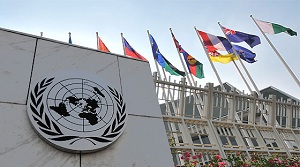 The Fourth Session of the UNESCAP Committee on Statistics, organized by the United Nations Economic and Social Commission for Asia and the Pacific (ESCAP), was held at the United Nations Conference Centre (UNCC) in Bangkok, Thailand on 25-27 March 2015. The Committee Session was attended by delegates from UNESCAP full and associate member countries and representatives from 18 international organisations. 10 out of the attending 33 UNESCAP member countries were also OIC member countries namely Afghanistan, Azerbaijan, Bangladesh, Indonesia, Iran, Kazakhstan, Kyrgyzstan, Malaysia, Maldives and Pakistan. The Centre was represented thereat by Prof. Savas Alpay, Director General, and Mr. Abdulhamit Ozturk, Researcher.
The Fourth Session of the UNESCAP Committee on Statistics, organized by the United Nations Economic and Social Commission for Asia and the Pacific (ESCAP), was held at the United Nations Conference Centre (UNCC) in Bangkok, Thailand on 25-27 March 2015. The Committee Session was attended by delegates from UNESCAP full and associate member countries and representatives from 18 international organisations. 10 out of the attending 33 UNESCAP member countries were also OIC member countries namely Afghanistan, Azerbaijan, Bangladesh, Indonesia, Iran, Kazakhstan, Kyrgyzstan, Malaysia, Maldives and Pakistan. The Centre was represented thereat by Prof. Savas Alpay, Director General, and Mr. Abdulhamit Ozturk, Researcher.
The Session was opened by the Vice Minister of Information and Communications Technology of Thailand and followed by the statements of Director of the ESCAP Statistics Division on behalf of the Executive Secretary of ESCAP and Director of UN Statistics Division. An election of the Bureau took place afterwards in which the delegates elected the following countries for the next two sessions:
-
Chair: Maldives
-
Vice-Chairs: Indonesia, Republic of Korea, Russian Federation
-
Member: Vanuatu
-
Rapporteur: New Zealand
The Fourth Session of the ESCAP Committee on Statistics discussed and provided guidance for several subjects including:
-
Strategic direction and functioning of the Committee on Statistics
-
Regional initiatives
-
Global initiatives: Agricultural and rural statistics
-
Coordination of statistical capacity building activities
-
Items for information: Crime statistics, ICT, Global geospatial information management, World Statistics Day 2015 etc.
-
Consideration of the future focus of the statistics subprogramme of the UNESCAP Secretariat
Furthermore, five side events took place before and during the Fourth Session:
The Seventh Meeting of Partners (Partnership) for Statistics Development in Asia-Pacific was held on 24 March 2014 and attended by over 20 people from different agencies. The Partnership members discussed about positioning the partnership in the context of the emerging sustainable development goals and partnership statement to the ESCAP Committee on Statistics. For more information please visit: http://www.unescap.org/events/partners-statistics-development-asia-pacific
Side event “Collaborating to Strengthen Statistical Institutions” took place on 24 March 2014 to discuss how Partners in Statistics Development in Asia-Pacific and various Expert Groups endorsed by the Committee can collaborate better to strengthen statistical institutions with a focus on monitoring the progress of statistical capacity building in the Asia-Pacific Region. The meeting was attended by over 50 delegations from the NSOs of member states and international organisations.
Two lunch-time events took place during the Fourth Session of the Committee on Statistics. The first event was held on 25 March 2015 on the subject “New Framework for Work Statistics by the 19th International Conference of Labour Statisticians (ICLS)” facilitated by ILO Regional Office for Asia and the Pacific. The seminar discussed the new advances in labour statistics standards, with a particular focus on the new definition of employment and its possible implications for employment indicators. Second event was and Expert Panel Discussion titled “From Gender Statistics to Gender Equality Policy” on 26 March 2015 organised by the Regional Coordination Mechanism (RCM) Thematic Working Group on Gender Equality and Empowerment Women and Working Group on Gender Statistics. The panel consisted of 4 speakers to highlight perspectives of data users and producers. They discussed the vital role gender statistics plays in identifying and designing effective social and economic policies that promote gender equality.
The side event to the Fourth Session of the Committee on "Statistics on Geospatial Information and the Data Revolution: “A Quick Win” for Sustainable Development in Asia-Pacific" was held on 27 March 2015. The contributors illustrated different ways in which geo-spatial information is being used around the region to promote better evidence for improved policy implementation, and the speakers discussed through a panel session in detail how this tool can be used effectively for measuring and monitoring the progress of the SDGs.
All the information and documents related to the Fourth Session of the Committee on Statistics and side events can be accessed through the following link: http://www.unescap.org/events/committee-statistics-fourth-session
The Fourth Session was adjourned after the adoption of the report of the Committee.
The Committee on Statistics is a biennial meeting organized by the Statistics Division of ESCAP. For more information on the need for quality data, please visit: http://www.unescap.org/our-work/statistics
Document
Photos